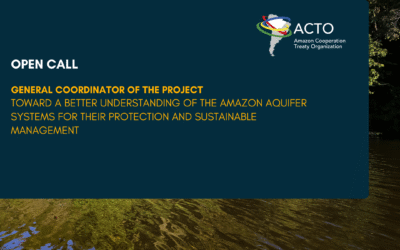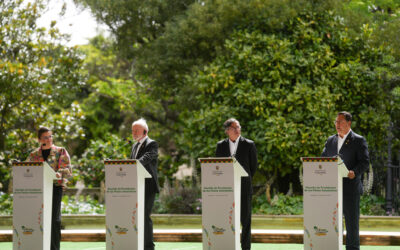The Secretary General of ACTO, Alexandra Moreira, in the context of her participation at the Thirty-ninth session of the Economic Commission for Latin America and the Caribbean (ECLAC), met with the Executive Director of the Latin American and Caribbean Demographic Center (CELADE) of ECLAC, Simone Cecchini. On the occasion she highlighted the study “Sociodemographic Inequality Gaps in the Amazon Region: A Proposal of Indicators for Visibility”.
This study is being conducted by ACTO and ECLAC with the purpose of providing regional information, exclusively on the Amazon territory, based on socio-demographic indicators with a multidimensional vision, evidencing the fact that the Amazon region should not be classified as a middle-income region. Alexandra Moreira sustains that, owing to its very nature and development levels, the Amazon region cannot and should not be compared with the national GDP levels of its countries. The study Sociodemographic Inequality Gaps in the Amazon Region is part of the “Project to Support the Elaboration and Implementation of the Amazonian Strategic Cooperation Agenda (ASCA)”, which is being executed as part of the trilateral South-South technical cooperation established between the Brazilian Cooperation Agency (ABC) and the ACTO. Referring to this issue, on October 25, during the presentation of the high-level panel on international cooperation in the face of a new multilateralism, several Latin American and Caribbean countries stated that the middle-income country classification poses a barrier to access to international cooperation, as it is being assessed using the sole per capita income indicator, not in accordance with the multidimensionality that should be considered in the variability of indicators.
In her remarks, the ACTO Secretary General referred to the joint work being carried out within the framework of regional cooperation by the eight Amazonian countries in their different working spheres. She also stressed that in no way should the Amazon region be understood as being of middle-income and that it requires more funding to be able to address the priorities established by the Member Countries.
“In addition, we must contribute to the fulfillment of international commitments in the context of multilateral agendas, such as the 2030 agenda and Climate Change and Biological Diversity, both of which have renewed commitments over the coming months as the international negotiations conclude,” she said.
She also expressed her agreement with the relevance of ECLAC’s role in working on a new narrative and methodology to ensure that developing countries may not be affected by the middle-income countries’ classification. However, whatever work is done in this regard, it must yield results in a timely manner, to meet the short deadlines set in the agendas and commitments of the countries. She also emphasized how urgent it is that international funds and cooperation be able to provide timely and continuous financing. “In fact, there are blocs of countries such as ACTO acting jointly, but when faced with projects of such an extensive dimension as is the case of the Amazon, funds are insufficient, so it is necessary for international cooperation windows to consider expanding and opening mechanisms to work from a regional perspective and action”, concluded Alexandra Moreira.
The Thirty-ninth session of ECLAC is held from October 24 to 26 in Buenos Aires, Argentina.











